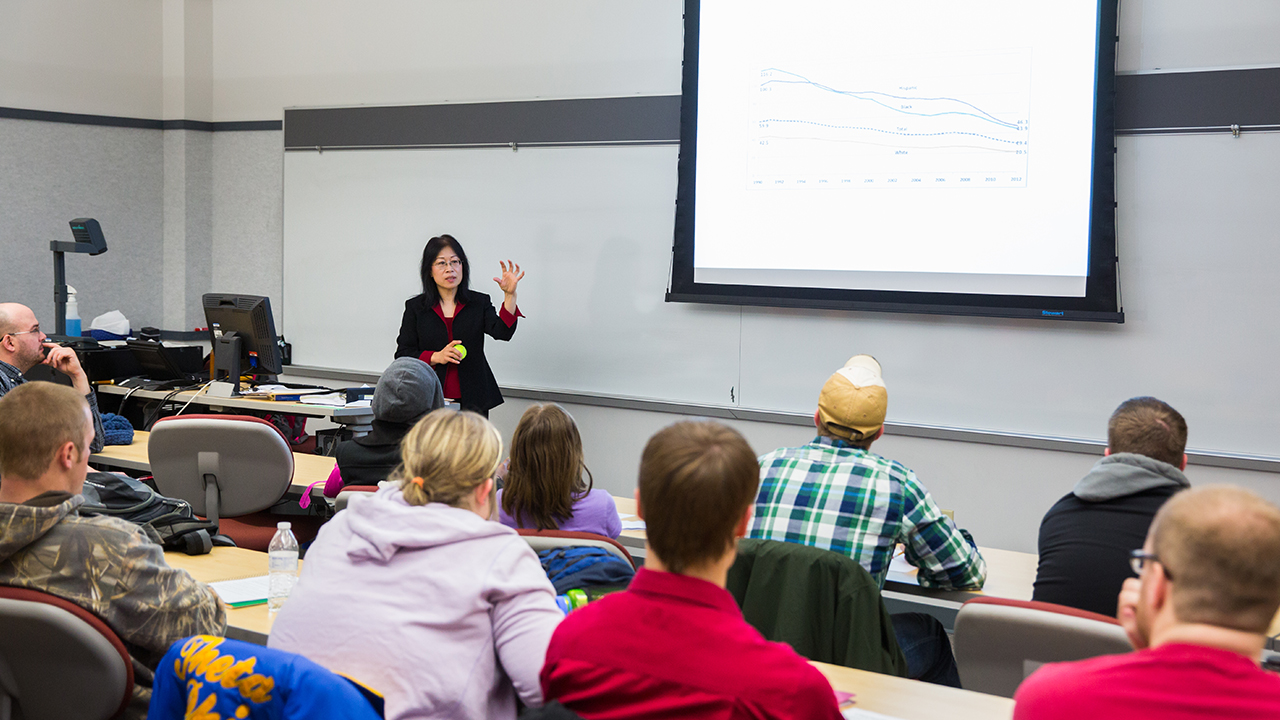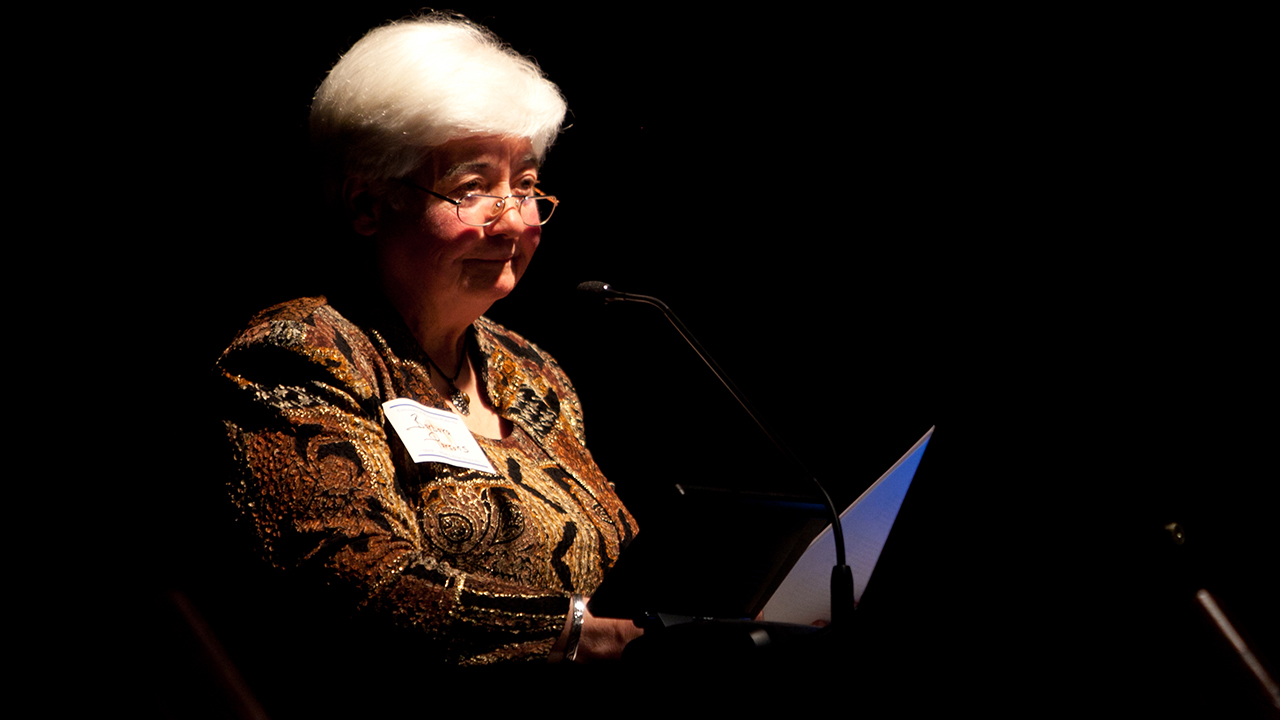

In 2013, Dr. Dong Isbister, associate professor, was hired as the only full-time faculty member of the University of Wisconsin-Platteville’s Women’s and Gender Studies Program. A few years later, when she became program coordinator, she realized that she was unable to locate information about the history of the program – which just celebrated its 50-year anniversary – so she took it upon herself to change that.
“Institutional history is important for us to understand where we are coming from, what we need to do now, and how we plan for the future,” said Isbister. “Most of the senior staff and faculty members affiliated with the Women’s and Gender Studies program have retired, so I have this sense of urgency to document the program history for the people who will get here after us.”
Isbister initially had trouble finding materials, but she eventually located “Transforming Women’s Education: The History of Women’s Studies in the University of Wisconsin System,” a book published by UW-Madison in 1999. The book documents the creation and growth of the Women’s and Gender Studies program on campus, as well as the obstacles and, at times, hostility it faced.
“What I found amazing about the book is its historical overview of women’s and gender studies programs in the University of Wisconsin System, including public events and initiatives, activism, collaborative efforts, curriculum development, student engagement, and pioneers on each campus that has its own uniqueness,” said Isbister.
The authors of the text write, “At UW-Platteville, women faced an obstacle that the System's other institutions did not: Because of its longstanding identity as a bastion of the traditional male specialties of mining and engineering, the students and faculty were predominantly men. Established through the merging of one of the state's Normal Schools for teacher education and its first mining school … the Platteville campus climate continued to reflect its mining history. As one description of the school noted, ‘Even when a girl was occasionally enrolled at the mining school, the main force of activity and progression still remained masculine.’”
In 1971, the women faculty organized a two-week workshop titled “Freedom and Equality for Women: Toward Liberation.” This marked the unofficial start of women’s and gender studies education at UW-Platteville, although the women’s studies program was not officially created until 1976.
However, these early inceptions of the program did not go unopposed. The authors of the text write, “Yet even as these successes were being celebrated, efforts to defuse some of the blatant sexism on campus were less successful. During preparations for both the 1975 and 1976 homecoming parades, for instance, several floats displayed explicitly anti-feminist slogans, including one that had the banner, ‘Keep your women barefoot, pregnant, and out of the mine,’ a reference to the campus’s history as a mining school. Protests by women were met with defensive letters to the editor of the campus paper, but nothing was done to prevent the floats from being part of the homecoming parades. In 1976, two women – Barbara Parsons [professor of philosophy] and one of her students, Donna Gibbs – stood along the parade route and responded to the worst of the floats by throwing raw eggs at them as they passed by.”
“That exemplifies their courage, bravery and determination,” said Isbister. “And that is the kind of history we don’t have a lot of documentation of. We have to know the history before we know where we were, where we are, and where we want to go – especially the social, cultural, and political contexts in which these programs are perceived and stigmatized.”
Now, 50 years later, Isbister says the Women’s and Gender Studies program remains as relevant as ever. The program allows students to develop interdisciplinary critical thinking and analytical skills, cultural awareness, and examine personal and social values, as they explore coursework in American women's history; philosophy of gender and sexuality; gender and popular culture; ethnic and gender equity in education; women, gender, and justice; psychology of women and gender; management, gender and race; and more.
“When we look at the current student population and demographics at UW-Platteville, we see underrepresentation of students from diverse backgrounds,” said Isbister. “Our classes help us think about how lack of representation and inclusion may be rooted in certain established viewpoints and stereotypes that can keep some groups of students off campus. If we can educate students to become more culturally aware, then they can be active participants in building a more welcoming space.”
Isbister said the Women’s and Gender Studies program, and UW-Platteville’s requirement for students to take gender studies courses, aligns with the university’s mission to “empower each student to become broader in perspective.”
“When students leave the university, they are going to interact with people from all different backgrounds in the workplace,” said Isbister. “If they learn and know more now, they will be better prepared to lead and succeed in the future. Many of my graduating seniors who took my Introduction to Women’s and Gender Studies class indicated that they wished they had taken it sooner in college. They said they could definitely see where they could apply it – not only in the workplace, but in their own lives, including relationships.”
Reflecting on its 50-year anniversary, Isbister says she hopes the program continues to grow and be recognized for its role in promoting undergraduate research; diversity, equity, and inclusion at various levels; and interdisciplinary collaboration.
Isbister added, “Dr. Barbara Parsons, one of the pioneers for the Women’s and Gender Studies program at UW-Platteville, writes in ‘Sedition in a Sexist Society: The Platteville Paradigm’ (1980), ‘I, for one, believe that Platteville can be as good and hopeful a place as any in the University of Wisconsin System for students to come to know what it means to be a person.’ The committed and determined generations of faculty, students and staff, like Dr. Parsons and many others, have paved the way for the Women’s and Gender Studies program and its council members to engage in a well-rounded education for all students. Building on the past work of the brave Pioneers, the Women’s and Gender Studies program will continue to play its role in achieving the university mission through collaboration, innovation, and student engagement.”
For more information about UW-Platteville’s Women’s and Gender Studies program, visit www.uwplatt.edu/program/womens-and-gender-studies.